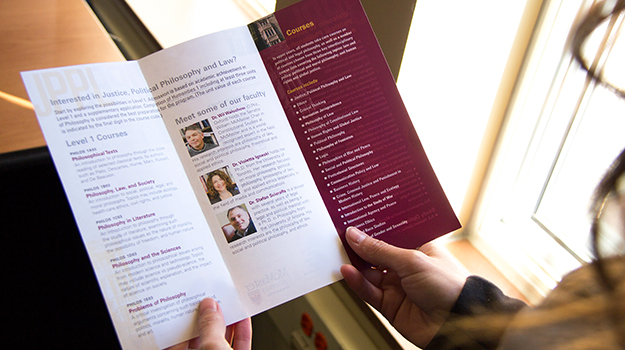Justice, Political Philosophy and Law program gains Ministry approval

According to Elisabeth Gedge, chair of the Department of Philosophy, a total of 54 McMaster students are in a position to graduate with a JPPL degree within the next year and a half.
The Ontario Ministry of Training, Colleges and Universities has formally approved McMaster’s new Justice, Political Philosophy and Law (JPPL) program.
Gaining Ministry approval was the final step toward offering this unique program to all students at McMaster — the culmination of two years of hard work by the Department of Philosophy.
“We are delighted that JPPL has been given formal approval and look forward to offering this degree program to our students,” said Elisabeth Gedge, chair of the Department of Philosophy. “We have 54 students that are currently in the position of graduating with a JPPL degree within the next year and a half.”
The program draws on pre-existing expertise in the philosophy of law within McMaster’s Department of Philosophy. Programs similar to JPPL exist in the United States, but few are offered in Canada at the undergraduate level — positioning the University as a national leader in this field.
JPPL offers a core selection of classes that all students in the program are required to take. These classes are augmented by a long list of interdisciplinary classes offered by the departments of Philosophy, Peace Studies, History, Classics, and English & Cultural Studies and several others. Classes are structured around three themes — law and policy; political and moral philosophy; and human rights and global justice.
“This interdisciplinary core reflects the program’s aspiration to offer students a broad-based liberal arts education that takes legal and political institutions as its focus of inquiry,” said Stefan Sciaraffa, an assistant professor in the Department of Philosophy. “Students will be literate in the kinds of complex legal, ethical, political and human rights issues that persist in our world today.”
Violetta Igneski, an associate professor in the Department of Philosophy, and Wil Waluchow, professor and Senator William McMaster Chair in Constitutional Studies, explained that a number of students were attracted to the program based on the kinds of options available after graduation.
“We expect that a sizeable number of students will want to go on to law school after JPPL,” said Waluchow. “Others may go into public policy, education, or even potentially into politics.”
Interested students can apply to JPPL after completing the Level 1 general program taken by most Humanities students.
Admission to the program is based on academic achievement in Level 1 as well as the completion of a supplemental application. Students are advised to complete at least three units of a first-year Philosophy class to help prepare for the JPPL program.

